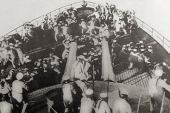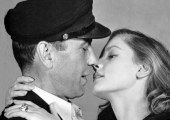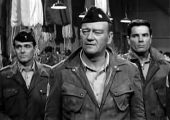|
 Guerra en el mar:
Guerra en el mar:
El acorazado Potemkin. Sergei Esenstein (1925):
El punto de partida de esta obra b sica del cine mudo es el amotinamiento de los marineros a bordo del acorazado Potemkin en 1905 por la mala calidad de la comida y la represi n en el puerto de Odessa, que se ha unido a la revuelta, hechos que tienen una gran influencia en la Revoluci n Rusa. Gracias a su sobria direcci n y al h bil manejo del denominado montaje de atracci n, el genial Eisenstein hace una pel cula clave del cine revolucionario y la cinematograf a sovi tica. Destaca la escena de la matanza de las escaleras del puerto de Odessa, punto de inspiraci n de numerosos cineastas y ejemplo cl sico del cine de montaje.
(Augusto M.Torres)
In Which We Serve. Noel Coward & David Lean (1942):
Stirring British World War II drama tells the personal stories of the surviving crew of a torpedoed destroyer. Writer/codirector/composer/star Coward does a superb job in all categories and creates a poingnant and moving story of patriotism, heroism, and honor without an iota of cloying sentiment. The excellent cast include Bernard Miles; John Mills, Richard Attemborough, Celia Johnson, Kay Walsh, Joyce Carey, Michael Wilding, and James Donald. The production has withstood the test of time in its portrayal of the stature of men at war. Oscars y nominaciones: pel cula y gui n.
 Tener y no tener. Howard Hawks (1945):
Tener y no tener. Howard Hawks (1945):
La floja novela hom nima de Hernest Hemingway da lugar a tres pel culas muy diferentes. La mejor es sta, escrita entre el excelente novelista William Faulkner y el buen guionista Jules Furthman, s lidamente producida y realizada por Howard Hawks y con la atractiva pareja formada por el duro Humphrey Bogart y la jovencita debutante Lauren Bacall. Aunque Michael Curtiz tambi n realiza para los estudios Warner una interesante versi n, The Breaking Point (1950), con John Garfield y Patricia Neal. Menos inter s despierta The Gun Runners (1958), de Donald Siegel, con Audie Murphy y Patrick Owens. Las tres narran c mo un patr n norteamericano ayuda a los fraceses frente a los alemanes en la Martinica durante la II Guerra Mundial.
Breaking Point. Michael Curtiz **(1950):
John Garfield protrays a desperate charterboat skipper who falls in with criminals and transports some illicit cargo. The script, based on Ernest Hemingway's novel, is slightly tedious, but the film is partially salvaged by the superb perfomances of Garfield and Juano Hernandez, who plays Garfield's first mate. Also with Patricia Neal, Phyllis Thaxter and Wallace Ford. 97 min.
 El d a m s largo (1962):
El d a m s largo (1962):
[The Longest Day]
Narra los preparativos y el desarrollo del desembarco en Normand a los d as 5 y 6 de junio de 1944. Se decidi filmarla en blanco y negro para aumentar el realismo y el tono de documental que quer a ofrecer. Es una gran producci n en el momento en que se inicia la decadencia de los grandes estudios, y en la que intervienen cinco directores y docenas de famosas estrellas de Hollywood. Direcci n: Ken Annakin, Andrew Marton, Bernhard Wicki y Gert Oswald. M sica: Maurice Jarre. Fotograf a: Jean Bourgoin.
The Cruel Sea. Charles Frend (1953):
A compelling screen adaptation of Nicholas Montsarrat's best-selling novel about the rigors aboard a British corvette in the North Atlantic during World War II. The taut drama depicts the dangers of encountering convoy-hunting Nazi subs as well as dealing with harsh weather. There are strong characterizations of the officers and men, too. With Jack Hawkins, Donald Sinden, Stanley Baker, John Stratton, Denholm Elliot, John Warner and Bruce Seton. Nominations: screenplay (Eric Ambler). 121 min.
Das Boot. Wolfgan Petersen (1981)
Gripping, finely detailed German production about U-boat life during World War II. The atmosphere of a sweaty, close-quarters existence is meticulously depicted and ever-present sense of danger adds suspense. In contrast to typical Hollywood war movies, the German submariners are portrayed here as real people rather than stereotyped characters. Nominations: director, screenplay based on material from another medium, and cinematography (Jost Vacano). 150 min.
|